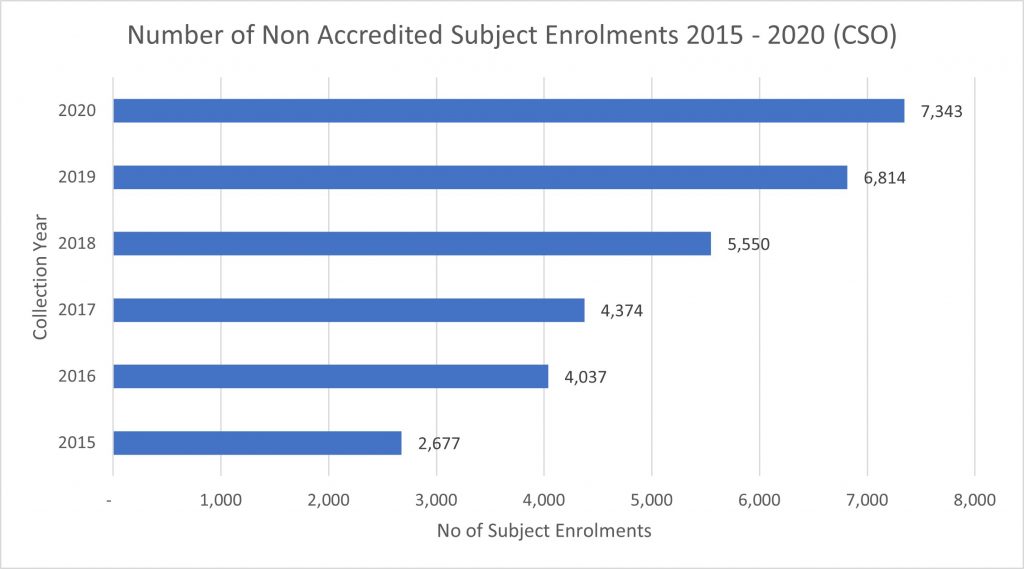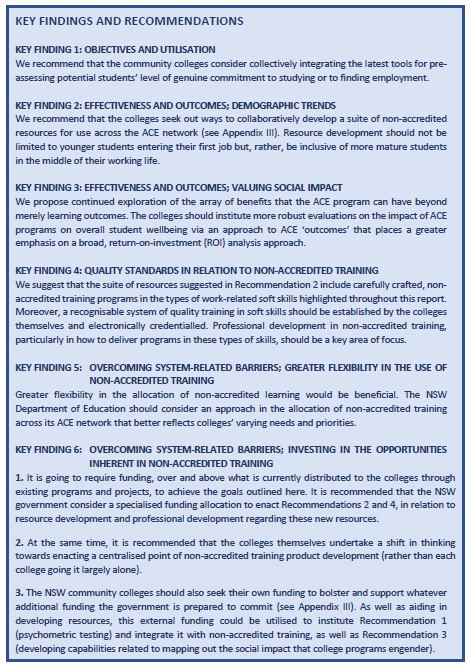A major new report from Riverina Community College examines non-accredited training within the New South Wales Adult and Community Education (ACE) Program. Entitled Supporting Pathways in Learning and Life, the report notes that, “While accredited education is a mainstay of the NSW ACE sector’s delivery of quality training, non-accredited programs have been playing, in recent years, an increasingly vital role within the range of courses offered by the colleges.”
The report results from a project that “investigated the potential benefits of such non-accredited training and how it impacts students in terms of their overall confidence, their engagement in the community and their employability as they transition to the working arena.”
Written by Dr Jim Cloutman, Director of Strategic Development at Riverina Community College, (Wagga Wagga NSW), the report was funded by the NSW Government’s ACE Teaching and Leadership research program.
Enrolments in non-accredited training have been steadily increasing in recent years, up to 7,343 in 2020 – from 6,814 in 2019 (see graph below, from the report, page 3, based on data from the NSW Department of Education).

The report notes: “The ACE sector provides a welcoming environment that seeks to meet the learning needs of its diverse cohorts of students through innovative, often custom-designed programs, particularly for those who are anxious about or not used to learning.”
The report summarises detailed research into the NSW ACE sector: “ACE leaders and managers saw non-accredited training as a means to engage students who had been left out of, or alienated by, traditional schooling. Mental health issues, negative previous experiences with school, low self-esteem in a learning context and significant socio-economic hardship were all identified as factors creating a need among vulnerable people, particularly younger (under 25) learners, to build up learners’ confidence in their abilities without frightening or demoralising them.”
The report makes a number of key findings and recommendations, which are listed in the box below.
Download a copy of the report through this link (PDF).
Comments on the Report
(Extracts from the Report’s Frontispiece)
Dr Don Perlgut, CEO, Community Colleges Australia: “This timely report summarises research into non-accredited training delivered by New South Wales adult and community education (ACE) providers as part of the NSW ACE program. The report is extremely valuable because it documents in detail that, for a large number of NSW ACE students, non-accredited training programs provide a crucial lifeline into learning, social and community engagement, and employment. This report comes at an important moment, as it outlines the vital role that non-accredited training plays in the changing environment of COVID-19, particularly the need for vulnerable and disadvantaged students to remain resilient, resourceful and engaged. The report draws on an abundance of data to reach its conclusions: qualitative data in the form of extensive interviews with NSW ACE provider staff complements quantitative data from state and national sources. The report examines the additional social value that can accrue from NSW ACE programs. It provides important recommendations aimed at tackling the challenges presented by a rapidly changing world of work for our students.”
Emeritus Professor Joy Higgs AM, Charles Sturt University: “Education is often seen as involving tests, exams and assessments of some form. As this report shows, whether that approach is required or not depends, to some extent, on context. For those who have been marginalised by their experience at school or who lack the confidence to engage with training, perhaps after many years away from education, this report emphasises the important role that non-accredited training can have in capturing this type of learner’s imagination and attention. It also draws out the value of this type of training as a pre-cursor to more traditional VET education. Finding out about ‘employability’, soft skills and the vital role these are increasingly playing in the modern workplace, has also been a valuable component of this research. Non-accredited training may well emerge as an essential component in any approach to developing the types of employability attributes described here.”
Key Findings and Recommendations
(from the Report, page 43)






